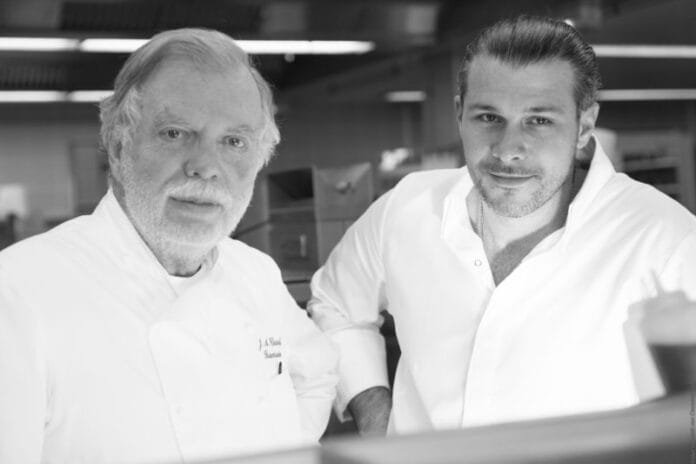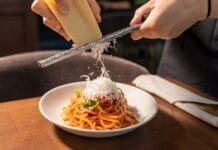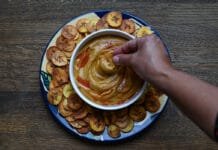We had the opportunity to spend the day and dine at the legendary Baumaniere in Provence. There, we spoke to two Michelin Starred Chef Jean Andre Charial and Chef Glenn Viel about what makes their restaurant successful, what inspires them, and lastly, some insider tips on Provence. Here are their thoughts. Note: the interview has been translated from French and edited for brevity.

Q&A with Two Michelin Starred Chef Charial & Chef Viel
Maria: What makes your restaurant successful?
Chef Charial: I’ve been here since 1969, for more than 50 years. I was able to work together with my grandfather for many years. At that time we had three Michelin stars and just after his death, we lost one star.
Maria: How’s did it feel to have awarded a Michelin star?
Chef Charial: As we lost one star, it wasn’t nice, it was more a sad feeling as typically you add stars to your restaurant but in our case, it was an inverse evolution. Normally, you go from 0 to 1, from 1 to 2 and they are happy to get 2 stars. In my case, I was not happy to have 2 stars as we already had 3.

Maria: How do you operate in Baumaniere?
Chef Charial: We have a large structure, we used to have six restaurants and now four. Here we have 140 employees and if we add the other 2 cities, Avignon and Courchevel we have 240 employees. I carried over all the restaurant management and the creation and responsibility of the Restaurant L’Oustau to Glenn (Chef Glenn Viel).
Today, I am still active with the menu choices and have a voice with the selections. I was the first chef who introduced the vegetable menu 30 years ago, therefore we discuss the combination of ingredients. If the combination is good, I am happy. Also, I like to keep certain plates that we served for 50 years. We have certain signature dishes such as the lamb and crêpes that we’ve kept on the menu for years and Glenn also introduces new dishes as well.
Maria: Why did you choose Les Baux de Provence?
Chef Charial: Les Baux de Provence chose me as my grandfather started this business. He arrived in 1945 just after the war and fell in love with this area. I believe he was ahead of his time with the advantage to be selected as the first “Relais et Chateaux” of the world. Before the war, there were already well-known restaurants awarded with three Michelin stars, all located on the main road called “La Nacionale 7”. Also, there were comfortable hotels in the villages but there weren’t hotels with gastronomic restaurants, so we became the first.
The idea to offer high-quality cuisine and luxury services in a unique location in the countryside, with a garden and swimming pool didn’t exist. Before Les Baux de Provence was not known but thanks to the automobile we now are known. Also, location matters as we’re not so far from Avignon, Arles, Aix en Provence, La Camargue on the way to Cote Azur.
There’s plenty to do in the region. If you love nature and old stones, there is a lot to discover, if you love vineyards and olive oil, there are plenty of farms and vineyards in the region. If you like birds you can visit La Camargue. From festivals to nature to wine, there’s so much to discover.

Maria: Tell me about the process of pairing wine and food?
Chef Charial: to do this you obviously need to be very knowledgeable about wine and we’ve tasted many throughout the years. In the end, the aim is to improve the flavors of the meal by choosing the right wine for the right dish. We need to find the right compliment between the dish and wine. To do that, you need to analyze the characteristics of both and find the best choice. We also have our own wine production. We are making 10,000 bottles of Baumanire champagne, 2,000 bottles of red wine and 3,000 bottles of rosé wine a year.
Maria: What is the creative process behind your dishes?
Chef Viel: Creativity, where does it end or where does it start? We don’t know. We have a traditional cuisine, so we need to have creativity but at the same time we need to keep our authenticity. To start, you need to get quality products, then everyone has their own perceptions and we try to conserve the qualities of each product. Creativity is not always visual, it could be a concept. For example, we replace salt by using a concentration of ingredients such as fish.

Maria: Was it a challenge for you to balance a legendary cuisine while trying to be creative?
Chef Viel: Not at all. Chef Charial didn’t impose anything on me. I understood the house and the cuisine that we offer therefore I didn’t have to force myself to anything. I love this cuisine. Today, this cuisine looks like me. Maybe in 10 years it will be something different, but today it is the cuisine that I like to do.
Maria: Can you tell us about your favorite creation on the menu?
Chef Viel: Yes, we have a milk-fed leg of lamb that is a traditional dish of the region. We have lobster, langoustines, prawns, and squid that are very well appreciated by our guests. We try to create dishes that are well accepted. We eat our whole menu every month to check if we still feel the emotions. The cuisine is not mechanic–there’s a human factor, we take moods into consideration. The most important thing is to create a dish that is right, honest, and equal.

Maria: What would you like for your guests to remember from the dining experience?
Chef Viel: I just simply want our guests to leave with a happy feeling, that they said they had a wonderful time and an enjoyable experience… Sometimes they said, “this was the best meal we ever had”. Also, we like to welcome people from new countries and we like our guests to leave with a wonderful experience. We invest in a lot of work in order to get the recognition. This is our satisfaction, know that they discover new flavors. Sometimes people forget the flavors of the ingredients and we like to reinforce this in our cuisine. Also, to allow them to remember a taste from their childhood.
Now, for me to have emotions in life you could think about 3 things: music, food, and smell, that have the power to give you flashbacks to the past. To me, our food does that. Since our cuisine it is inspired in the Mediterranean, most of our guests love that the ingredients come from our region. Our cuisine is 50 % taste, 25 % texture, 15% psychology, and 10% coincidence.

After very relaxing and enjoyable interviews with both chef Mr. Charial and Mr. Viel, we had the opportunity to visit the kitchen and meet the team. Being there allowed us to see and feel the team’s professionalism, concentration, and passion behind each creation to deliver a unique customer experience.

Maria: Our readers enjoy local tips from chefs. What three places do you recommend for visitors to see?
Chef Charial and Chef Viel: There is so much in the region and it depends on what they love to see. We are well located and close to other interesting cities like Avignon, Arles and Aix en Provence. For example, they could visit:
The Castle at Le Baux de Provence
Le Carriers de Lumiere
Wineries in Alpilles and not so far you have Châteauneuf-du-Pape
The Sunday morning market in Arles “The Capital of Provence Culture”
L’Isle-sur-la-Sorgue
Restaurants: there are many such as… Baumanière!
Here is a sample of our favorite dishes and wines we enjoyed:
Champagne Baumaniere
White wine: Abbaye, Sainte-Marie de Pierredon from Alpilles
Red wine: L’Affectif, 2012 special selection from Mr. Charial for L’Oustau de Baumaniere
Red Tuna “Tataki style”, gascona eggplant mousseline grilled with Olive Oil from Castelas, smoked anchovy, dill and fried capers
Leaf after leaf of pig, pig jus with corn, potatoes cooked in pig lard
We had a fabulous experience, I even had a flashback when eating the pork as it brought me back to the flavors of my childhood in my home country of Venezuela.








